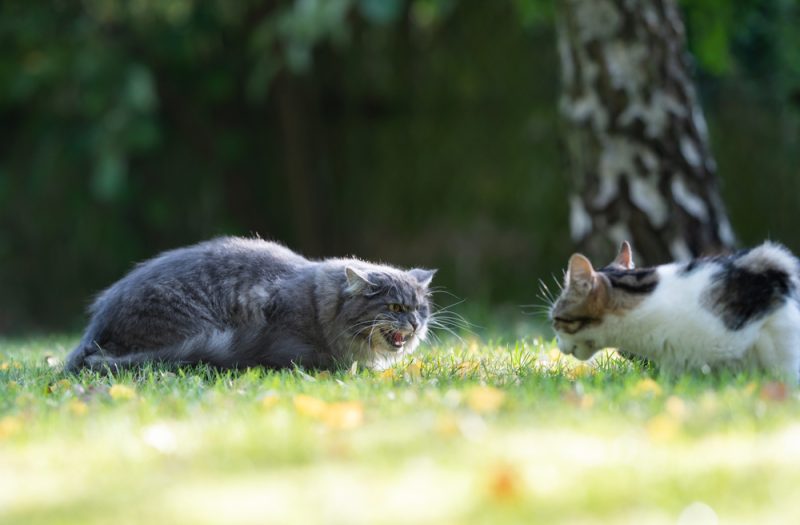Bringing a new kitten into the family is a happy experience for the humans in the household. But what about the other cats? Maybe not. Some cats get along right away, while others may take some time to warm to each other.
It’s completely normal for cats to hiss when they first meet and for a few days afterwards. Most people think hissing is a sign of aggression, but it’s actually another form of communication between cats (and with their owners).
It’s perfectly normal for cats to hiss when they encounter new objects (or people), but you might be wondering how long you should tolerate it. Read on to find out why cats hiss in the first place, and what you can do to help your pets get along.


How much hissing should you expect when getting a cat?
As mentioned at the beginning, hissing is a completely normal behavior for new kittens and house cats alike. Cats may hiss and hit each other for a few weeks until they get to know each other better.
While hissing itself is not aggressive, it can be your pet’s way of teaching a new animal some ground rules. Their Space. Cats tend to hiss when they feel threatened in some way, so think of hissing as a defensive gesture. It’s a cat’s way of expressing discomfort, fear, or stress. Hissing in itself is not usually a reason to act, but if your cat’s hissing is accompanied by aggressive behavior or posture, you should intervene discreetly. Behaviors such as growling, bristling fur, tense muscles, and perked ears can all indicate aggressive behavior.



Why do new cats hiss at each other?
1. Disruption to daily life
Whether you realize it or not, your cat is completely a creature of habit. Cats generally don’t like change and can become very anxious, stressed and confused when a new family member is added to the home. Your cat may need a little more attention than usual when you bring a new pet into your home.
2. Feeling trapped
If you rush to introduce your existing cat to your new kitten, you may inadvertently make both of them feel overwhelmed. Your existing cat needs time to get used to sharing space with another animal, while your new kitten may already be stressed from moving to a new home. Forcing your pets to meet when they’re already stressed can make your pet more likely to hiss or engage in aggressive behavior.
When introducing pets, never block the exit so they can exit and get to a safe place unhindered. Also, give your pets time to get close to each other instead of forcing them against each other. Allowing your pets to interact on their own time can make the process go smoother.

3. They feel their personal space is being violated
Another reason your cat may hiss is because they feel their space is being invaded. They’ve had your home all to themselves their whole life, so it’s no surprise they don’t want to share. Their Keep things moving with your new pet.
Hissing is an effective way to establish and reinforce the social hierarchy among cats in the home. Dominant cats may hiss to assert their position over other cats. Other territorial behaviors that dominant cats may display include hoarding toys, scratching to mark territory, spraying urine, growling, and challenging others to fights.
4. They set boundaries
Cats are notoriously territorial and may hiss at each other to define boundaries and establish authority. Hissing is a quick and effective way that a resident cat can tell a newcomer to stop intruding.



What to do if your cats are hissing at each other?
If the hissing noise isn’t going away as quickly as you’d like, there are a few other things you can try.
Sit and wait
The hissing itself is just a form of communication, so you don’t need to do anything — at least not right away. If the hissing continues and doesn’t stop after a few minutes, remove your cat and wait for him to calm down. Of course, if aggressive behavior or postures are accompanying the hissing, you should intervene as soon as possible to prevent a fight.

Slowly introduce
Introductions should be done slowly and carefully – there is a process for introducing cats to each other, and rushing it can increase the chances of cat aggression between them and put your pets at risk.
The cat that shows the most fear and distrust should dictate the pace of the introductions. Remember, this process may be lengthy, depending on your pet’s personality — it may take days, weeks, or even months for cats to learn to live in harmony with one another.
Don’t be afraid to reintroduce
If you rush the introduction period and your cats start hissing and fighting all day, it’s okay to separate the cats and start over.

Provide adequate resources
Aggression and hissing cats are sometimes the result of cats feeling they have to share their things. For this reason, you need to make sure each pet has access to their own things. Each one needs their own litter box, plus one more – so if you have three cats, you’ll need four litter boxes. They should also each have their own food bowl. Make sure there are plenty of toys, scratching posts and sleeping areas.


lastly
If you’re in the middle of the introduction process, pulling out hairs and wondering how long the hissing will actually last, know that this is likely to be a short period of time in your cat’s life. Hissing is a completely normal reaction for cats, especially when they are placed in new or stressful situations. Bringing a new cat into your home will inevitably be stressful for both your new pet and your existing cat, so some hissing is to be expected until you get to know each other.
It takes time for cats to get used to this living environment, which is why it’s so important to introduce your new cat slowly and carefully – let your cat set the pace and never rush him.
Featured image credit: Gurkan Ergun, Shutterstock




